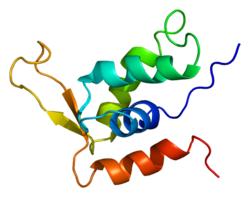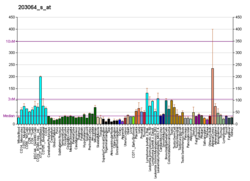FOXK2
Appearance
Forkhead box protein K2 is a protein that in humans is encoded by the FOXK2 gene.[5][6]
The protein encoded by this gene contains a fork head DNA binding domain. This protein can bind to the purine-rich motifs of the HIV long terminal repeat (LTR), and to the similar purine-rich motif in the interleukin 2 (IL2) promoter. It may be involved in the regulation of viral and cellular promoter elements.[6]
References
- ^ a b c GRCh38: Ensembl release 89: ENSG00000141568 – Ensembl, May 2017
- ^ a b c GRCm38: Ensembl release 89: ENSMUSG00000039275 – Ensembl, May 2017
- ^ "Human PubMed Reference:". National Center for Biotechnology Information, U.S. National Library of Medicine.
- ^ "Mouse PubMed Reference:". National Center for Biotechnology Information, U.S. National Library of Medicine.
- ^ Durand DB, Shaw JP, Bush MR, Replogle RE, Belagaje R, Crabtree GR (Jul 1988). "Characterization of antigen receptor response elements within the interleukin-2 enhancer". Mol Cell Biol. 8 (4): 1715–24. doi:10.1128/MCB.8.4.1715. PMC 363332. PMID 3260003.
- ^ a b "Entrez Gene: FOXK2 forkhead box K2".
Further reading
- Li C, Lusis AJ, Sparkes R, et al. (1992). "Characterization and chromosomal mapping of the gene encoding the cellular DNA binding protein ILF". Genomics. 13 (3): 665–71. doi:10.1016/0888-7543(92)90139-J. PMID 1339390.
- Li C, Lai CF, Sigman DS, Gaynor RB (1991). "Cloning of a cellular factor, interleukin binding factor, that binds to NFAT-like motifs in the human immunodeficiency virus long terminal repeat". Proc. Natl. Acad. Sci. U.S.A. 88 (17): 7739–43. doi:10.1073/pnas.88.17.7739. PMC 52378. PMID 1909027.
- Nirula A, Moore DJ, Gaynor RB (1997). "Constitutive binding of the transcription factor interleukin-2 (IL-2) enhancer binding factor to the IL-2 promoter". J. Biol. Chem. 272 (12): 7736–45. doi:10.1074/jbc.272.12.7736. PMID 9065434.
- Wiemann S, Weil B, Wellenreuther R, et al. (2001). "Toward a catalog of human genes and proteins: sequencing and analysis of 500 novel complete protein coding human cDNAs". Genome Res. 11 (3): 422–35. doi:10.1101/gr.GR1547R. PMC 311072. PMID 11230166.
- Liu PP, Chen YC, Li C, et al. (2003). "Solution structure of the DNA-binding domain of interleukin enhancer binding factor 1 (FOXK1a)". Proteins. 49 (4): 543–53. doi:10.1002/prot.10227. PMID 12402362.
- Strausberg RL, Feingold EA, Grouse LH, et al. (2003). "Generation and initial analysis of more than 15,000 full-length human and mouse cDNA sequences". Proc. Natl. Acad. Sci. U.S.A. 99 (26): 16899–903. doi:10.1073/pnas.242603899. PMC 139241. PMID 12477932.
- Ota T, Suzuki Y, Nishikawa T, et al. (2004). "Complete sequencing and characterization of 21,243 full-length human cDNAs". Nat. Genet. 36 (1): 40–5. doi:10.1038/ng1285. PMID 14702039.
- Tsai KL, Huang CY, Chang CH, et al. (2006). "Crystal structure of the human FOXK1a-DNA complex and its implications on the diverse binding specificity of winged helix/forkhead proteins". J. Biol. Chem. 281 (25): 17400–9. doi:10.1074/jbc.M600478200. PMID 16624804.
- Zody MC, Garber M, Adams DJ, et al. (2006). "DNA sequence of human chromosome 17 and analysis of rearrangement in the human lineage". Nature. 440 (7087): 1045–9. doi:10.1038/nature04689. PMC 2610434. PMID 16625196.
- Beausoleil SA, Villén J, Gerber SA, et al. (2006). "A probability-based approach for high-throughput protein phosphorylation analysis and site localization". Nat. Biotechnol. 24 (10): 1285–92. doi:10.1038/nbt1240. PMID 16964243. S2CID 14294292.
External links
- FOXK2+protein,+human at the U.S. National Library of Medicine Medical Subject Headings (MeSH)
- Overview of all the structural information available in the PDB for UniProt: Q01167 (Forkhead box protein K2) at the PDBe-KB.
This article incorporates text from the United States National Library of Medicine, which is in the public domain.








